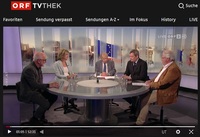The Western Balkans as Trouble Spot
Roundtable Debate in Austrian Television with Marie-Janine Calic
27.05.2019
Recently, the Balkans have seen many anti-government protests. Some, like in Belgrade, Tirana and other cities, went even violent. Last Sunday, 26 May 2019, the second television programme of Austrian's public service broadcaster ORF broadcasted live a roundtable debate about the recent development of the "Western Balkans as a trouble spot" as part of its "Europastudio" series. Professor Dr. Marie-Janine Calic, Professor of East and Southeast European History at LMU Munich and Principal Investigator of the Graduate School, took part in this discussion, which addressed the present situation, the fault lines and possible solutions.
Despite the conciliation attempts of the German Chancellor Angela Merkel and the French President Emmanuel Macron with the Heads of State or Government of the Western Balkans at their Berlin Conference in late April, the region seems to remain a hotspot of trouble in many ways. There are still no signs of the desired "constructive dialogue" between Serbia and Kosovo. Instead, the possibility of a territorial exchange or of "border adjustments" is discussed, following old dangerous paths. The perspective of an EU membership is attractive but vague for most countries in Southeast Europe. New initiatives in the EU's Balkan policy would, however, be important - not least because of Russia's expansive political strategy and because of China's growing economic influence in the region. Moreover, the efforts of Turkey for Muslims in Bosnia might endanger the fragile post-war balance. The continuing anti-government demonstrations in Belgrade and Tirana, with protests against proliferating corruption and authoritarian tendencies, show how long the road towards the rule of law and liberal democracy, and thus the longed-for EU accession, still seems to be. Northern Macedonia is a rare example of successful conflict resolution with Greece. However, it remains questionable whether, the originally planned accession talks with North Macedonia and Albania will take place at all. Despite the upcoming changing of the guard in Brussels, the European Union should pay more attention to the Balkans because without the prospect of the European option, nationalist forces from Serbia to Bosnia, from Kosovo to Albania, could all too easily trigger cross-border conflicts.
Professor Dr Marie-Janine Calic participated in a ORF2 Europastudio debate chaired by Professor Paul Lendvai. The other discussants were Andreas Ernst (Neue Zürcher Zeitung), Michael Martens (Southeast Europe correspondent for the Frankfurter Allgemeine Zeitung) and Christian Wehrschütz (ORF correspondent for the Balkans and Ukraine).
Video (in German only)
Europastudio: Zeitbomben am Balkan
ORF2 / orf.at, "Europastudio", 26. Mai 2019


